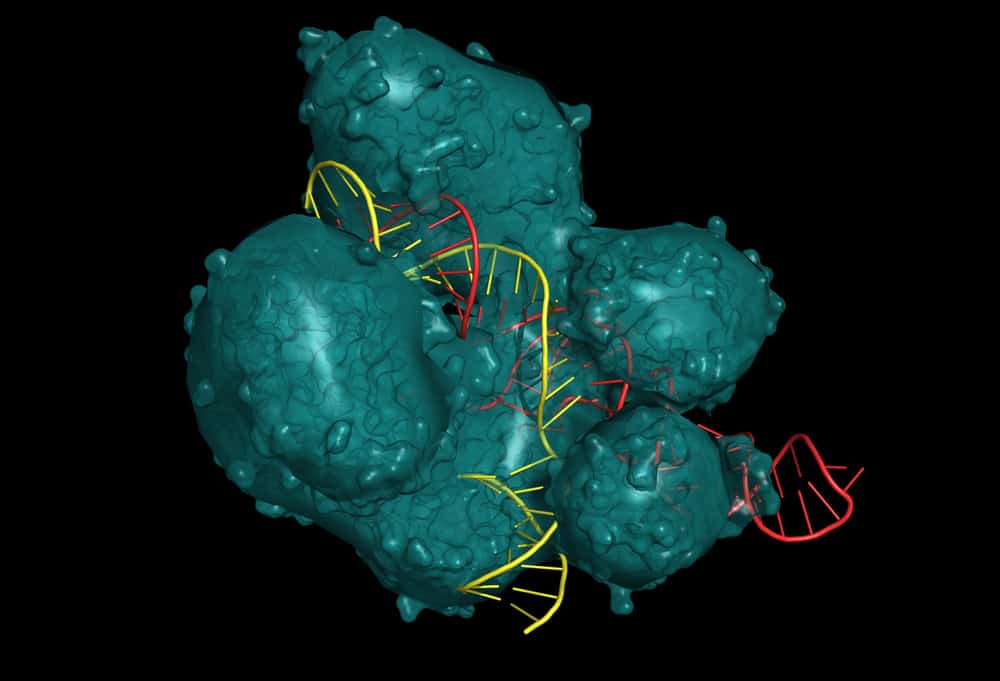Transthyretin amyloidosis (ATTR amyloidosis) is a rare but fatal disease marked by clumping and accumulation of mutated, misfolded transthyretin proteins in peripheral nerves and cardiac tissue. Most patients experience neuropathy and/or cardiomyopathy, and average survival from disease onset is between two and 17 years. About 50,000 people worldwide have its autosomal dominant inherited form.
Current therapies, which have only become available in recent years, aim at reducing amyloid protein accumulation, either by binding to the TTR tetramer or disabling amyloid messenger RNA, also known as “RNA silencing.” These options can reduce accumulation by up to 80 percent, but they require ongoing treatment to maintain those levels, often have severe side effects, and only slow disease progression — but there is new hope. A recent paper published in the New England Journal of Medicine and discussed in Nature details promising early phase data for a therapy that may not only offer a new option for patients, it may usher in a new era of medicine.
The treatment was developed by Intellia Therapeutics, Cambridge, Massachusetts, and Regeneron, Tarrytown, New York. If it ultimately passes through clinical trials and receives government approval, it will represent the first effective treatment for ATTR amyloidosis. It will also be the first therapy to show safety and efficacy when CRISPR–Cas9 components are infused into the bloodstream to target a protein made mainly in the liver. Until now, CRISPR–Cas9 has only been used in cells that were removed from the body, edited, and then reinfused into trial participants.

A Promising Start to Clinical Trials
The CRISPR-Cas9 therapy, called NTLA-2001, consists of a lipid particle that carries a single guide RNA targeting TTR, the gene that expresses the TTR protein, and the Cas9 editing protein. Nearly all TTR proteins are produced in the liver, and in their normal (unmutated) form they transport the thyroid hormone thyroxine and Vitamin A. Since ATTR amyloidosis is a single-gene disease, a specific CRISPR-Cas9 construct was ideal for editing the TTR gene to reduce protein production.
In preclinical animal models, editing TTR in liver cells reduced TTR proteins by 95 percent or more. Initial results from the Phase 1 clinical trial on six patients showed that a higher dose (0.3 mg/kg) reduced levels of amyloid in nerve and heart tissues by about 87 percent on average, with one patient recording a protein reduction as high as 96 percent. A lower dose (0.1 mg/kg) reduced levels by 52 percent. No serious side effects were associated with either dose.
Systemic Administration, Targeted TTR
While the early efficacy data are exciting enough, the fact that this therapy is administered via infusion with the reported outcomes achieved after just one intravenous dose is what’s generating the most buzz among the scientific community. The initial dose groups in the Phase 1 trial (0.1 and 0.3 mg/kg) were treated with single doses and showed dramatic reductions starting 14 days after infusion, leveling out at a clinically significant low volume 28 days after infusion.
Researchers obtained serum test samples from the patients at the trial’s beginning, as well as at one, two and four weeks after initiation. The trial is continuing as researchers test the safety and effectiveness of incrementally higher doses of the CRISPR-Cas9 therapy.
Opening the Door to Effective Treatments
The in vivo gene-editing approach used in this study is currently being investigated for use in other diseases with different organs’ cells as targets. With a goal to one day treat sickle-cell anemia without bone marrow transplants, Intellia’s research teams also successfully delivered CRISPR–Cas9 components to bone marrow cells in mice. In-vivo gene editing research is also underway with ocular and neurological applications, offering hope for many patients with previously untreatable diseases.
QPS is proud to have been involved in early-stage research with Intellia Therapeutics and Regeneron as they pursue what may be the first effective treatment for ATTR and will continue with its ELISA and pharmacokinetic and biomarker testing to support this study.
Did you enjoy this blog post? Check out our other blog posts as well as related topics on our Webinar page.
QPS is a GLP- and GCP-compliant contract research organization (CRO) delivering the highest grade of discovery, preclinical and clinical drug research development services. Since 1995, it has grown from a tiny bioanalysis shop to a full-service CRO with 1,100+ employees in the U.S., Europe and Asia. Today, QPS offers expanded pharmaceutical contract R&D services with special expertise in neuropharmacology, DMPK, toxicology, bioanalysis, translational medicine and clinical development. An award-winning leader focused on bioanalytics and clinical trials, QPS is known for proven quality standards, technical expertise, a flexible approach to research, client satisfaction and turnkey laboratories and facilities. Through continual enhancements in capacities and resources, QPS stands tall in its commitment to delivering superior quality, skilled performance and trusted service to its valued customers. For more information, visit www.qps.com or email info@qps.com.







